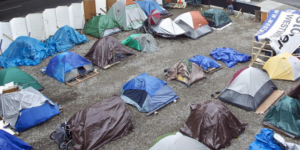On May 7, Denver will vote on Initiative 300, the so-called “Right To Survive” measure, which would repeal the city’s urban camping ban. Being pushed by alleged advocates for the city’s homeless, it would permit sleeping and even camping on any public ground in the city.
Initiative 300 is a terrible deal for the city’s residents, whether homeowners or renters, and it’s equally bad, if not worse, for the homeless population it purports to help.

Civic leaders have tended to underplay the effects on homeowners, but the middle class is worth more than a passing mention. Homeless camps become centers of lawlessness and chaos, avoided by most responsible citizens. Forcing customers to run a gauntlet to grab lunch or a cup of coffee, making public spaces unsafe for residents and uninviting to visitors all damage the economic vibrancy of the Denver.
More than that, allowing people to camp on the space between the sidewalk and a street greatly increases the chances of a dangerous confrontation between a homeowner and a homeless person who may suffer from mental illness or drug use. With the police defanged until such a confrontation actually takes place, people will inevitably begin to feel unsafe in their own homes.
Individually, these may appear to be inexpensive annoyances for an otherwise affluent population, but we should bear in mind that unlike taxes, which can in theory be spent to help the homeless, these inconveniences are pure cost, contributing nothing to our economic well-being or civic life. It’s one reason that the opposition group, Together Denver, is led by usually left-leaning local businessmen, not by conservative Republicans.
But as bad as I-300 would be for homeowners, it would be even worse for the homeless. Rather than getting people the help they need, it would encourage them to stay in a vulnerable and dependent state. There is currently room in the city’s homeless shelters for those who want to stay there; one suspects that the professional advocacy class is more interested in perpetuating a clientele than in helping them.
The city’s current and potential mayors agree that I-300 is a terrible idea. At a March 25 mayoral candidates forum hosted by the Lincoln Club of Denver, all the candidates opposed I-300 as unhelpful to the homeless, although their approaches to the problem differed. All of them agreed that rather than encouraging people to sleep out in the cold, the city should be providing shelters, temporary housing, and mental health services.
Both![]() Mayor Hancock and candidate Jamie Giellis pointed to other cities’ experiences with homeless encampments. Hancock exclaimed, “Look at the other cities who have allowed this to happen,” alluding to but not mentioning by name San Francisco, Los Angeles, and Seattle, three cities who have been overrun with homeless camps. And while Hancock noted that Denver already spends $50 million a year on homelessness, Giellis remarked, correctly, that “No city has really solved this problem.”
Mayor Hancock and candidate Jamie Giellis pointed to other cities’ experiences with homeless encampments. Hancock exclaimed, “Look at the other cities who have allowed this to happen,” alluding to but not mentioning by name San Francisco, Los Angeles, and Seattle, three cities who have been overrun with homeless camps. And while Hancock noted that Denver already spends $50 million a year on homelessness, Giellis remarked, correctly, that “No city has really solved this problem.”
San Francisco is now famous for its poop maps, Los Angeles is seeing the return of medieval diseases afflicting its homeless populations, and a recent KOMO TV special report focusing on the Emerald City’s ubiquitous homeless tents, alleged that “Seattle is dying.” These baleful effects have been accelerated by the concentration of homeless into encampments.
Candidate Penfield Tate noted that homeless encampments tend to develop their own social support networks. That may be true, but attempts to exploit those networks rather than integrate individuals into larger society have proved ruinous.
In Minneapolis, the city has made the conscious decision to try to provide public services to a large and growing homeless encampment. The result has been that the encampment has grown even faster, spreading disease, turning into an open-air drug market, and with its own non-profit security arrangement that has left city aid workers afraid to visit the place to deliver actual help. How this benefits the actual homeless who live there remains a mystery.
We should also understand that our ability to provide those services to the homeless is dependent on Denver remaining economically strong. Driving down property values and making the city unattractive for business only makes it harder to take care of marginalized individuals.
Denver’s vote isn’t taking place in a vacuum. For the fifth time, Rep. Jovan Melton (D-Arapahoe) is running a similar statewide bill, “Right To Rest.” He asked that the bill be postponed, pending Denver’s vote, in the hope that if I-300 passes, it will provide some additional impetus not only to his bill, but to other smaller cities around the state.
If the voters of Denver do what’s right by their city and by their homeless population, Rep. Melton will be very disappointed come Election Night.
Joshua Sharf is a Denver resident.


